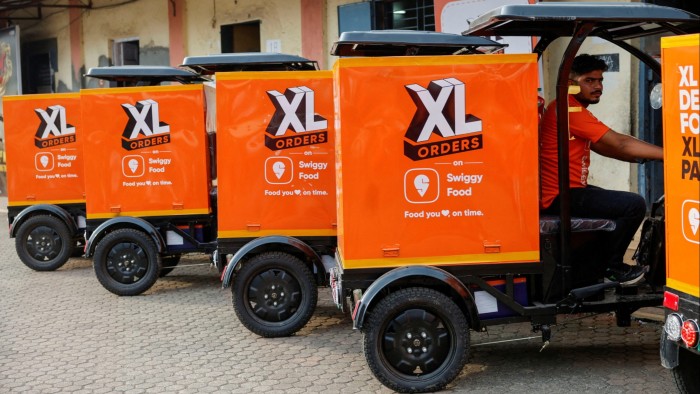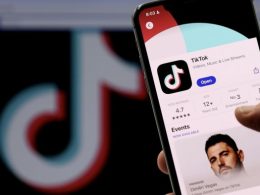Stay informed with free updates
Simply sign up to the Indian business & finance myFT Digest — delivered directly to your inbox.
Trading in Indian food delivery app Swiggy begins on Wednesday in a $1.3bn initial public offering that investors have already given a lukewarm reception, as it tries to grow in a fiercely competitive sector.
On Friday, institutional investors shored up Swiggy’s listing on its final subscription day as the Bengaluru-based company chased a valuation of about $11.2bn.
Swiggy’s listing — India’s second-largest this year — received bids more than three times the shares on offer, with the retail portion just covered.
It is one of a glut of Indian companies that rushed to list and capitalise on elevated valuations this year as the country’s stock market soared.
But Swiggy’s IPO, with early backers including Tencent and venture capital fund Accel cashing out, has landed against a backdrop of dismal earnings across corporate India. The benchmark Nifty 50 index has fallen 3.5 per cent over the past month with foreign investors dumping a record $11.2bn of Indian equities in October.
It comes just weeks after Hyundai’s tepid $3.3bn float of its Indian business, which was Asia’s largest IPO this year. While Swiggy slightly outperformed Hyundai’s ratios, it was underwhelming compared to earlier Indian sales that drew in fevered buying from local investors.
Operating in more than 600 cities in India, Swiggy’s losses widened 8 per cent to Rs6.1bn ($72mn) in the three months through June from a year earlier, as it faces strong competition from the industry’s profitable and dominant market leader Zomato, as well as newer challengers such as Zepto.
“It’s still some time away before Swiggy reports a strong performance,” said Karan Taurani, a Mumbai-based analyst at Elara Capital. He added that the company’s “fair” valuation at a roughly 60 per cent discount to Zomato leaves little “upside” ahead of its Wednesday debut.
Decade-old Swiggy pioneered ultrafast delivery services in India, serving groceries within 20 minutes in the country’s crowded cities. That business accounts for 40 per cent of the app’s food delivery sales and Swiggy has built out more than 500 local warehouses known as dark stores to enable a fast churn of small-volume orders in a tight radius.
Some analysts and local fund managers had warned that despite a surge in domestic investment among households, the IPO boom that saw India become the world’s largest listing market outside the US would struggle to be sustained by local bidders.
“There is concern about the IPO market”, said Nirgunan Tiruchelvam, the Singapore-based head of consumer and internet at Aletheia Capital, an advisory group focused on Asia.
Consumer goods companies in India are struggling with weakening demand in the country’s cities as stubborn inflation and a retail credit crackdown by the central bank hits the spending power of middle-class Indians.
At a press conference last month, Swiggy’s chief executive Sriharsha Majety dismissed signs of consumer strife. “At this point we have not been seeing that, the businesses have been demonstrating strong growth,” he said.
The Indian delivery sector has seen several high-profile casualties in recent years, such as Uber Eats and local courier app Dunzo. The latter collapsed this year despite backing from Reliance Industries, the Indian conglomerate owned by Mukesh Ambani, Asia’s richest man.
Swiggy has “lagged” Zomato, which went public in 2021, in both food delivery and quick commerce, according to Axis Capital. In response, Swiggy has earmarked about Rs12bn from the IPO proceeds to expand its dark store network, which feeds its rapid commerce arm operating in more than 30 cities.
While still a small part of India’s overall retail landscape, quick commerce has experienced explosive growth. Indian investment bank JM Financial predicts the industry could surge to $40bn by the end of the decade, driven by increasing urban demand for affordable and convenient delivery services.
“The food delivery business is, pun intended, delivering profits in other markets,” said Tiruchelvam, pointing to the success and scale of China’s biggest delivery platform Meituan.
“One is bullish about the asset class in a mass market like India where smartphone penetration is expanding and infrastructure for food delivery is improving.”
Source link








